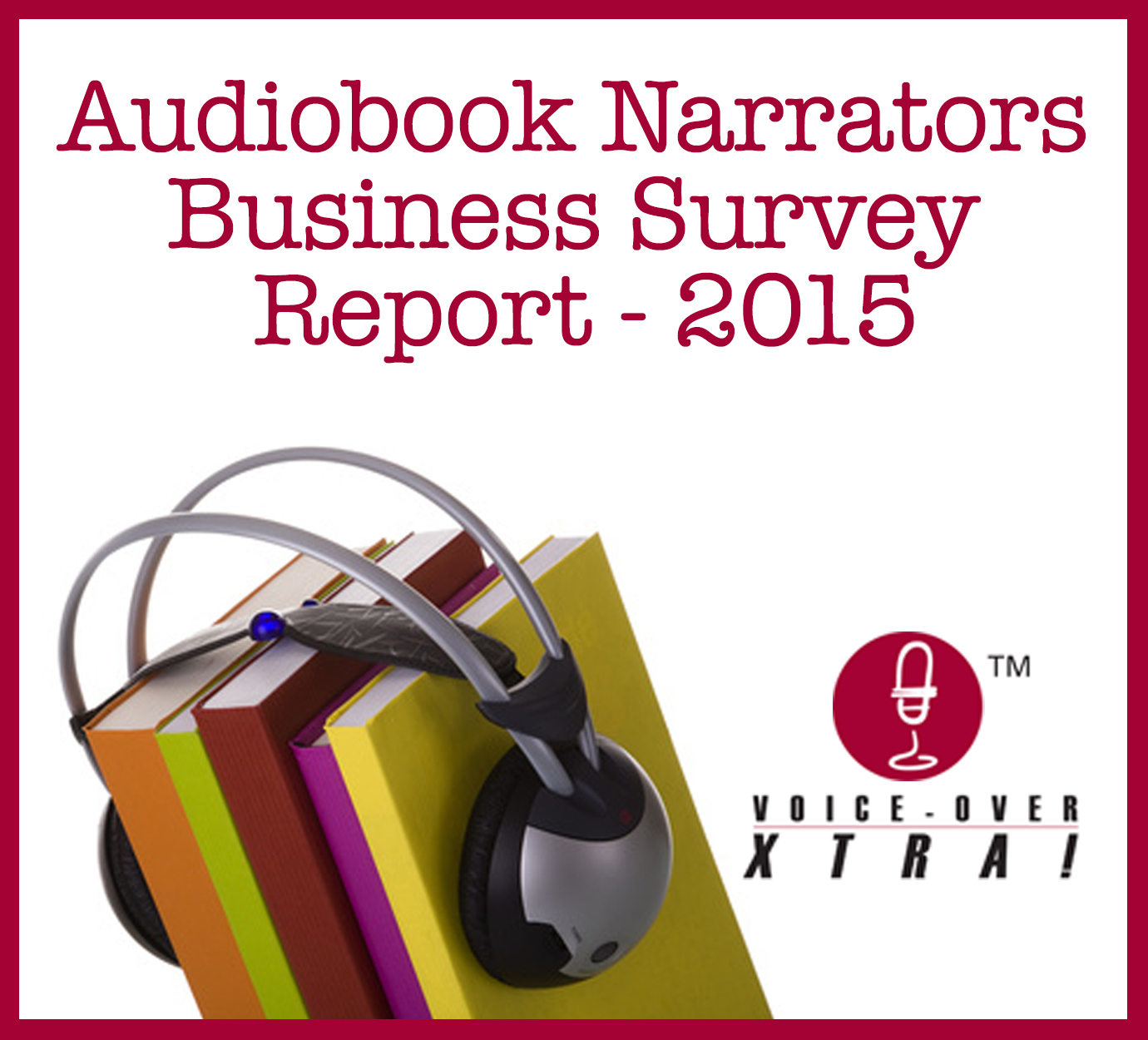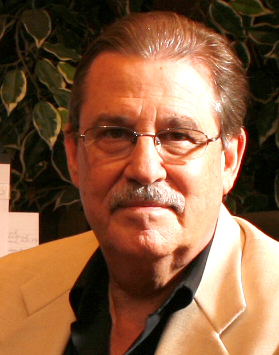AUDIOBOOK NARRATORS SURVEY - REPORT 4
Breaking Into The Majors: How Narrators
Get Work From Major Audiobook Publishers
June 18, 2015
See Report 1: Levels Of Experience, What And How They Narrate
See Report 2: What Narrators Earn, Methods of Compensation
See Report 3: Are Narrators Satisfied With Earnings?
See Report 5: Narrators Rant and Rave
 By James Conlan By James Conlan
Audiobook Narrator, Voice Actor & Coach
Survey Reports Co-Author
In the VoiceOverXtra Audiobook Narrators Business Survey 2015, we asked participants whether they narrate for major publishers - and if so, how did they obtain that status?
Highlights of their responses are below, followed by their actual comments. But first, some background.
A common thread through the comments to many of our survey questions indicates a certain hierarchy of
achievement. Most narrators seem to start with royalty share projects, move up
to cost per-finished-hour when they are able, then hope to catch the attention of major
publishers, where best-sellers promise the largest rewards.
Around a third of the replies came from narrators who do at least some work for the major book
publishers. Another third of replies indicated some work with independent
production companies. Eighty percent of replies mentioned some work
on royalty-based projects, and 70% obtain work through ACX.
Note: There's lots of overlap, as narrators who work with major publishers might also work with independents and ACX.
If such a presumption of hierarchy is accurate, it's now helpful to learn how narrators snare major-publisher
projects; hence, our question about getting to the majors.
And you'll be gratified to know that there's a variety of ways our respondents have moved up.
For instance, more than one person offered each of the following
routes to success:
- Networking
- Publisher contacted them
- Attended APAC
conventions
- Sent demos to publishers (many respondents said this)
- Took classes
with influential narrators
- Submitted auditions
- Word of mouth
- Entered
contests
- Being very good (lest we forget!)
- Publisher discovered me on ACX
- Got
work through audiobook agent
- Auditioned for casting directors
Now learn directly from survey participants how they successfully entered the majors ...
IN NARRATORS' OWN WORDS ...
-
Used to narrate
stories on commercial radio, currently work mostly thru ACX.
-
Networking.
-
Networking. Calling publishers.Sending CD demo.
- Building relationships at APAC
- Sub-contracted publisher.
- They found me.
-
I sent them a cover email with an MP3
demo, repeatedly.
- Auditioned for them at convention.
- Sent demo.
-
Sent in a demo, followed up, auditioned
at the studio, and stayed in touch.
- Building relationships over time. Also,
attending APAC.
- They contacted me.
- Networking.
- They met me at conference in
LA. My book now in second edition.
- Legwork and marketing. You approach the
publisher with your demos. You network at audiobook events like APAC. Take
classes with renowned coaches who have connections and will recommend you to
publishers if they are asked for a 'type.' You need to develop a web presence
with a website and social media accounts in Twitter, Facebook and LinkedIn.
- The same way you get to Carnegie Hall.
- Word of Mouth, an interview, training
and a schedule.
-
Through current work, profile on ACX or
my submission to various publishers and production companies.
- Personal auditions
- Member of APA and NATF.
- Amazingly, it started with an audition
on Voices dot com.
-
I studied, made a demo, went to APAC,
met publishers and cultivated relationships.
-
I simply emailed them and enquired about
obtaining their business!
- I wrote the contract
-
Emails of inquiry, sending samples,
referencing workshops taken with Pat Fraley and Paul Ruben, citing winning
3rd place in Scott Brick's Share the Experience contest, etc.; i.e. CONTACTS,
PERSISTENCE, and having the QUALITY of narration to back it up (25 years of
acting and teaching acting/voice doesn't hurt in that regard!)
-
I was randomly called by a studio to
come in and audition for an audiobook job. Booked it.
-
I sent out a newsletter and demo mailer
to gain interest.
- I was contacted by the publishers and
asked to audition.
- From various sources, some direct
contact and some from p2p sites, like Voices.com, eLance, Bodalgo, etc
-
Networking, networking, networking.
- One through audition, another, author
request within contract with publisher.
-
Personal marketing to publisher.
-
Many by word of mouth - referral
-
I have done one project direct for
Audible Studios but it was an outsource project through the late Vanessa Hart
- who was hired to a contract with multiple book contracts and allowed to
outsource to other narrators.
-
Doing a great job, Audible made me an Audible Approved Producer but hasn't
used me since.
- Contacted me and vetted my home studio
- Through being hired by production
companies
- hard work, networking
- Through introduction by a friend
-
I auditioned for a production house that was assigned books to produce.
-
I have only done one book at a major
publishing house (Penguin), and it was thru my agent. This level seems to be
much more difficult to break into. It's mainly either thru agents, or
being more well known in the business and being requested.
- Word of mouth, referrals from other
talent.
- By being very good. Very professional. Very easy to work with. By having paid my dues and learned my craft.
-
I began my career narrating for an icon
in the AB world who opened many doors for me. I rarely am asked to audition any more. The awards and attention
helped somewhat, but humility be damned, and I'm trying to be as truthful as
possible...I'm very, very good at it. And work begets work.
- Word of mouth and submissions
- I auditioned in 1999 and worked for many
years for Books-on-Tape, being directed in their Los Angeles studio, before
branching out to self-direction and building my home studio.
-
I narrated for Oasis Audio and this came
about by sending my CD samples and an introductory letter.
-
I narrated for Audible and they came to me, after I'd been doing ACX titles
for about a year (I think).
- Worked first for independent producers,
then, after 20 or so titles, asked major producer for work. Been narrating for 25 years.
-
Good luck in meeting Debra & Bob
Deyan. And "starry eyed" to
have gotten swept up by Tantor when they were trying to avoid a walkout by
their established talent.
- Getting to know people in the industry
over time, having an excellent studio sound, and, well, having training and talent!
- Entering contests, emailing, persistence
-
Being good at what I do (and 30 years in
business helps)
- networking then auditioning
- Personal relationship.
- Producer/director hired me.
- Direct contact - sent in demo
- Persistence, workshops, relevant
experience
-
I did 4 ACX jobs. Had a corporate VO
audition and got an audition at a local publishing house. I worked with them
for a year and got my feet wet. I was also discovered on ACX and did some
work for another publisher. Then I submitted to another major house, was
hired right away and work for them since continually.
- Auditions and luck and self-promotion
and good timing, and (somewhere in there) I hope, some talent.
-
Got invited to a mixer. Met them,
shopped around my demo.
-
Via voiceover agent
- Auditions, persistence in reaching out
with demos
-
Via direct contact and auditions with
publishers.
- Through an independent audiobook
publisher I first worked with through ACX.
-
2 years after I sent in demo file, they
reached out to me.
- Started out via a recommendation to
Brilliance, & when they decided to "retire" me because I
believed they could & should pay me Union wages with a P&H
contribution, I created my own home studio and successfully marketed myself
to other publishers. I now work with
other, large publishers (Audible, Tantor & Blackstone) on a regular
basis.
-
Ha! If I narrated for major publishers,
I wouldn't touch ACX.
- Direct contact with casting
directors/producers, demo submissions, and auditions.
- A gazillion years of working, and doing
high quality work.
- Through producers that work directly
with the publsher.
-
Making personal connections w/
publisher-producers & independent producers was key. Having clients refer
me to their peers helped. Relentless hustling & the luck of good reviews
and awards and other media attention has kept me in the game.
- They contacted me.
- I spent years working on my craft as an
actor. When I turned to audiobooks, I made a good demo, sent it to every
producer I could. I joined the APA, and spent years slowly building
relationships and doing the best work I could - garnering some awards, marketing
myself as best I could, and adapting to the changing marketplace as best I
could.
-
I prepped. I had an excellent attitude working with my
engineers and directors whom I learned much from. They passed on my name to others. It's tougher now for some great talent I
know to experience this with self-recording becoming the norm and that one-on-one interaction getting lost. I'm one
of the fortunate ones.
- Auditions, word of mouth. Was very lucky
to be involved with Audible.com before they became a major player in the
industry.
- Studied acting in college, did
film/tv/stage work, networked through the APA, practiced my craft, auditioned
until I broke through, kept studying, solicited new relationships to grow my
client base. Keep studying.
-
I started before the industry included
ACX and the standards for quality, experience, and compensation were
drastically lowered. It helps to live in NYC. But nothing replaces
experience, feedback and direction from professionals. Having an agent makes
a difference, having best-selling, award-winning titles helps. It still
requires networking!
- Marketing and Auditioning
- 10 years of marketing, dogged
persistence, and remaking demos often.
- I auditioned initially, and now I am
hired based on my body of work.
-
First with the assistance of my
voiceover agent, and then via professional reputation.
- audition, initially, then word of mouth
and introductions
That's simply how I got my start, and it
snowballed from there. Now when I do work on ACX I command a much higher fee.
- Auditions and contacts over the years.
-
Several years of working and networking.
- Audition and networking
- Went to APAC in NY and met with the
publishers
- Query letter following APA contact.
-
I studied with some of them when classes
or seminars were offered. This way they got to see my work, then they tried
me out and started hiring me to narrate.
- Through Deyan audio. I started there. That was the only route really, when I
started.
-----------------------------------------------------------------------------------
ABOUT THE SURVEY & REPORT AUTHORS
 JOHN FLORIAN JOHN FLORIAN
John Florian is a voice actor and publisher of VoiceOverXtra,
the voice over industry's online news, training and resource center. A
former print publishing executive and magazine editorial director, he
founded VoiceOverXtra in 2007, which today offers the voice over
community industry news, how-to features, online and workshop training,
the Voice Over Legal guide, and an ever-growing online resource center of articles and links. In 2013, he produced Voice Over Virtual, a major online industry conference.
Web: www.VoiceOverXtra.com
Email: johnflorian@VoiceOverXtra.com
 JAMES (JIM) CONLAN JAMES (JIM) CONLAN
Jim Conlan
has led a dual career for most of his adult life: advertising executive
and voice talent. As a founder of Radio Works, he has written and
produced thousands of radio commercials for clients all over the
country. As a voice talent, he learned from some of the best in the
business by directing on an almost daily basis. Jim now devotes most of
his time to training voice talent, doing voice over projects, and
narrating audiobooks. Some 40 titles are currently available on Audible
under the name, James Conlan. "So I wasn't just a co-author of the
survey," Jim says, "I was a respondent!"
Email: provomaster@yahoo.com
Web: www.provomaster.com
Your Daily Resource For Voice-Over Success
|
 By James Conlan
By James Conlan JOHN FLORIAN
JOHN FLORIAN JAMES (JIM) CONLAN
JAMES (JIM) CONLAN


.png)






Steve Latham